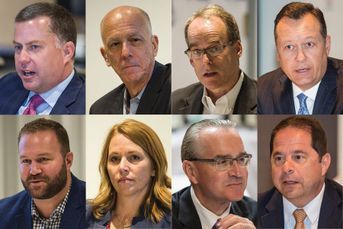Time for 401(k) plans to step into the modern age
The world of work has changed dramatically in the past 20 years, but some of our laws and…
The world of work has changed dramatically in the past 20 years, but some of our laws and customs have not kept up with these changes. The result can be harmful for workers who are relying on employer 401(k) savings plans to fund their retirement.
A new report from the Government Accountability Office details a number of employer practices left over from a bygone era that threaten to reduce substantially the amount of money workers in the prime of their lives will be able to save for retirement — in some cases, by hundreds of thousands of dollars.
The biggest change in the workforce affecting the ability of younger workers today to save for retirement is the mobile nature of work. Unlike their grandparents — and in some cases, their parents — young people today will not spend the bulk of their working lives at one or two companies. According to the Bureau of Labor statistics, a private worker in 2014 spent only 4.1 years on average at a job. Further, workers 18 to 48 can expect to have more than 11 different jobs on average in their lifetimes.
OUTMODED RULES
While there is nothing inherently wrong with changing jobs repeatedly over the course of one’s life, it can have a deleterious effect on retirement savings. That’s because many employers still have outmoded rules in place that dictate how long employees have to wait to join a retirement plan and receive employer matching contributions and the length of time they have to be employed before they are vested in the employer’s matching contributions.
The GAO found that before allowing workers to join a 401(k) plan, some companies require workers to be at least 21 years old and to have worked a full year. In other cases, companies make employees work another full year before becoming eligible for company matching funds and work a full calendar year after that to qualify for that year’s matching contributions. Vesting is another issue. Some employers require workers to stay on the job six years before they are fully vested.
Many of these rules were motivated by the desire to lower the cost of employer plans and reduce employee turnover, the GAO said. But the result of these practices is that employees are not able to save as much money as they would if they could join the plan from Day One. They are also leaving money on the table when they exit a job before becoming fully vested.
(Related read: Government Accountability Office pushes DOL to update 401(k) annuity rules)
The GAO crunched some numbers and concluded that losing just one year of eligibility 11 times could result in a loss of $411,439 over the course of an individual’s working life. Having an 18-year-old wait until he turns 21 to join a 401(k) plan could cost the employee $134,456 in savings by the time he turns 67. Faced with these hurdles, it’s no wonder some young workers are in no hurry to sign up for their company 401(k) plan.
A FRESH LOOK
The GAO urged Congress to take a fresh look at these policies and make changes if necessary to make it easier for workers to save the maximum for retirement.
What does all this mean for retirement plan advisers? At the very least, advisers should make it known to plan sponsors that have policies such as these in place that they are probably hurting participation in their plans and may even be damaging their ability to recruit workers. Just as potential employees often weigh the pros and cons of an employer’s health insurance plan, more and more will be looking at retirement plans. It is time for employers to update their 401(k) plans by making sure they are truly portable and built for the modern workforce.
Learn more about reprints and licensing for this article.








